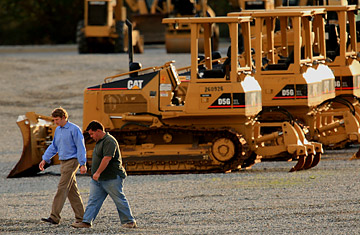
Men walk near rows of Caterpillar products
"Everybody ... of course they're nervous," says Doty, 54, a Caterpillar machinist. But, he adds, "you've got to hope this thing is going to get turned around sooner or later. I don't think it'll be sooner, but you've got to stay positive." (See the worst business deals of 2008.)
Caterpillar is an iconic American corporation, producing everything from the tractors and earth-moving machines that come in archetypal construction yellow to footwear and boots. Its early 1900s tractors helped revolutionize the construction industry — and inspired the first military tanks that took to battle in World War I. But now Caterpillar is facing a very 21st century ordeal, one that almost all other companies face amid what is arguably the gravest economic crisis since the Depression. On Monday, Caterpillar joined other U.S. companies in announcing the collective loss of some 75,000 jobs at operations worldwide. (See pictures of the stock market crash of 1929.)
Until then, Peoria seemed to have been coping with the recession. The region's unemployment rate had risen only modestly, from 4.5% to 6.2%, between November 2007 and November 2008. Home sales had fallen slightly, but far less than the state's average. So news of Caterpillar's crisis landed with a painful thud in the city of roughly 113,000, which counts the company as its largest employer. Caterpillar hasn't disclosed how many of its displaced workers live in this region, but about one-quarter of its global workforce is based in Illinois, mostly around Peoria. As light snow fell late Tuesday afternoon, dozens of Caterpillar workers marched out of a company plant on the far edges of the city. Their faces were grim. No one was in the mood to talk. The last time Caterpillar faced a similar crunch was in the early 1980s, when the company had to deal with the combination of recession and loss of market share to a fierce Japanese competitor, Komatsu. (See pictures of the recession of 1958.)
Many in Peoria are preparing for the worst. Pierre Serafin, co-owner of UFS, a discount store here, says customer foot traffic has remained steady, although average sales are down 10% from a year ago. Because fewer people are buying homes, there's less of a need for appliances. The handful of folks buying refrigerators are trading down from stainless steel to the less expensive "stainless mist," which, Serafin says, "looks almost like stainless steel."
The local UAW's January meeting was filled with Caterpillar workers asking the assembled panel of experts for tips on how to retrain themselves for new jobs. At next month's meeting, Doty says, "we'll probably have those people back to address those same questions." Few here have clear plans on how to recover. Folks who years ago dropped out of college to take jobs at Caterpillar — jobs they assumed would take them into retirement — are strongly considering returning to get their degrees. Doty offers this advice to union members who have been ordered to take one- or two-week furloughs: Go on a fishing or ski trip, just to clear your mind.
Doty isn't immune to anxiety. In the coming weeks, he's set to take a one-week furlough himself. And many of the jobs at his plant are bound for Texas, a state with comparatively relaxed labor laws and weaker unions.
